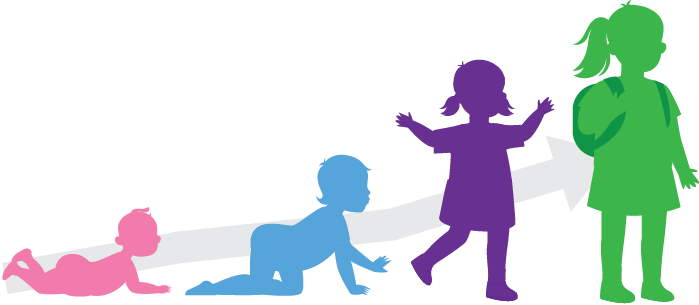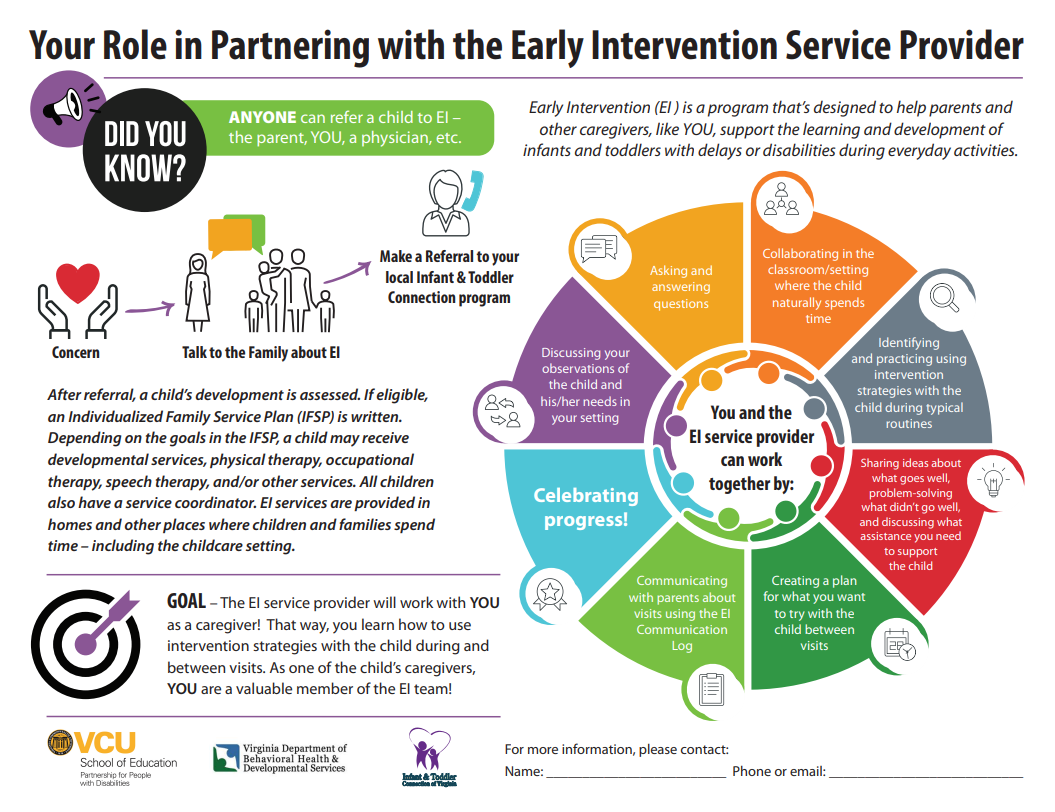Early Intervention
What is Early Intervention?
The Infant & Toddler Connection of Virginia offers early intervention services for infants and toddlers (birth to age three) who have developmental delays or medical conditions that may affect their development. These services are designed to support your child’s growth by helping them take part in everyday family and community activities that matter to you.
Early intervention also empowers parents and caregivers by providing strategies to support their child’s learning during daily routines. Services are available to all eligible children and families, regardless of income or ability to pay.
Virginia’s early intervention system is part of the federal Part C program under the Office of Special Education Programs, with the Department of Behavioral Health and Developmental Services (DBHDS) serving as the lead agency in the state.

Is Your Child Eligible for Early Intervention (EI) Services in Virginia?
Your child may qualify for EI services if they meet one or more of the following conditions:
- Developmental Delay: Functioning at least 25% below their chronological or adjusted age in one or more areas: cognitive, physical (including fine and gross motor skills), communication, social or emotional, or adaptive development.
- Atypical Development: Exhibiting atypical or questionable behaviors or development, such as unusual sensory-motor responses, social-emotional challenges, or behaviors that interfere with acquiring developmental skills.
- Diagnosed Physical or Mental Condition: Having a diagnosed condition with a high probability of resulting in developmental delay, such as Down syndrome, cerebral palsy, hearing or vision loss, or other specified conditions.
Accessing Early Intervention Services
Early intervention is a system of services that helps babies and toddlers with developmental delays or disabilities. Early intervention focuses on helping eligible babies and toddlers build on their basic skills while learning new skills that typically develop during the first three years of life, such as:
- physical (reaching, rolling, crawling, and walking);
- cognitive (thinking, learning, solving problems);
- communication (talking, listening, understanding);
- social/emotional (playing, feeling secure and happy); and
- self-help (eating, dressing)
If an infant or toddler has a disability or a developmental delay in one or more of these developmental areas, that child may be eligible for early intervention services. Those services will be tailored to meet the child’s individual needs. Such services may include:
- Assistive technology (devices a child might need)
- Audiology or hearing services
- Speech and language services
- Counseling and training for a family
- Medical services
- Nursing services
- Nutrition services
- Occupational therapy
- Physical therapy
- Psychological services
Services may also be provided to address the needs and priorities of the child’s family. Family-directed services are meant to help family members understand the special needs of their child and how to enhance his or her development.
Authorized by law, early intervention is available in every state and territory of the United States. The Individuals with Disabilities Education Act (IDEA) requires it–Part C of IDEA. That’s why you’ll sometimes hear early intervention referred to as Part C.
How to Start the Process:
- Contact Your Local ITCVA Program: Reach out to your local Infant & Toddler Connection program to express your concerns and request an evaluation.
- Referral and Intake: A service coordinator will guide you through the referral process, gather necessary information, and schedule evaluations. Or submit a referral form yourself as a parent
- Evaluation: With your consent, a multidisciplinary team will assess your child's development to determine eligibility.
- Individualized Family Service Plan (IFSP): If eligible, the team will collaborate with you to develop an IFSP, outlining goals and services tailored to your child's needs.
Cost of Services Early Intervention services are available to all eligible families in Virginia, regardless of income. Services are provided at no cost or on a sliding fee scale, depending on the family's ability to pay.
Does my child need Early Intervention Services?
Do you have questions or concerns about your child’s development, or does your child have a developmental disability? Would you like to learn if your child could receive services? There is a program in Virginia that can provide you with the support you need. Children birth through age two (until a child’s third birthday) may be eligible for early intervention services with The Infant and Toddler Connection of Virginia. You can request that your child be screened to see if he/she is eligible for services. To do this, contact your Central Point of Entry.

Each locality in Virginia has a central point of entry, which is the location you call in your community to request a screening. Once the call has been placed to your local Infant & Toddler Connection, they will work with your family to determine if your child is eligible for services. This is often called an eligibility determination.
Never be afraid to approach your child’s pediatrician with your concerns. Early Intervention services provide your child the best opportunity to reach their full potential and help prepare you to best support them in their development. The earlier you approach your pediatrician with your concerns, the earlier services can begin.
Early Intervention's Coaching Model
Early Intervention services in the state of Virginia follow a coaching model. The coaching model is a family-centered model of intervention where therapists guide parents through the problem-solving process to attain self-identified goals for their child. This means that providers and therapists will work with parents and caregivers to provide techniques and skills to help their child achieve their goal in the natural environment of their own home. These strategies can be applied to mealtime, bath time, story time, and virtually anything in the child’s life can be manipulated to be therapeutic for his or her development. Parents are encouraged to engage with providers to continue building on their child's achievements. The goal of the coaching model is to empower parents and caregivers to continue being the best teachers they can be and to continue building on the needs of the child.

Learn More about Learn the Signs. Act Early (LTSAE)


